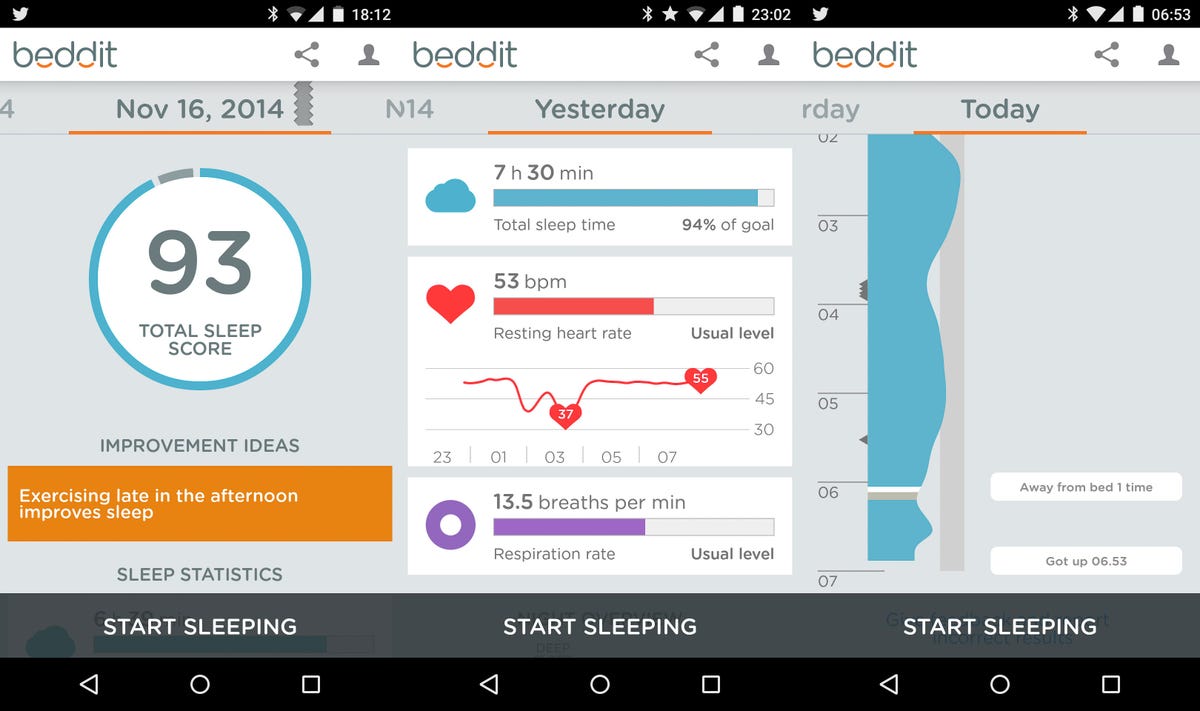
Stephen Shankland/CNET
A lot of health monitors supplement your own observations. You can count your steps as you walk, clock your lap time as you jog and scrutinize your heart rate as you bike.
But what about when you can’t pay attention because you’re unconscious? I’ve been trying a sleep monitor from Beddit, and it has given an eye-opening look at what goes on when my eyes are closed.
Beddit is among a growing number devices that attempt to quantify our bodies. Fitness buffs were the first to adopt them, and step-counters like the Fitbit have helped bring them to a more casual audience. The profusion of devices has been made easier by crowdfunding sites such as Kickstarter and Indiegogo, where Beddit got its start, by connecting new gadgets to customers who who are willing to pay. That’s also how the Misfit Shine activity tracker got its start — and now Misfit is selling Beddit through a partnership for people who want round-the-clock monitoring.
The $150 gadget is a long strip that slips underneath your sheets so you don’t have to wear anything. It monitors your movements, sending data via a Bluetooth wireless connection to an Android phone or iPhone. There, an app processes your data and presents you with a daily report.
I found it a useful view of my slumbering self. I have a pretty good idea of when I get enough sleep and when I don’t, but the Beddit reveals subtleties about snoring and sleep quality, too.
And checking that sleep score number when you wake up can be motivating — at least for the right person.


Screenshot by Stephen Shankland/CNET
The score — from 0 to 110 — is influenced chiefly by how close you got to your goal for hours of sleep. Other factors like getting up in the middle of the night and snoring cut it down. The app offers tips on how to improve your score, like losing weight to reduce snoring.
It’s hard to be sure how well the system works, since by definition you’re not paying much attention when it’s at work. But Finland-based Beddit tests its products in sleep labs where more sophisticated measurements can be taken, said Antti Ylimutka, Beddit’s head of marketing. Beddit’s data is good enough that, in raw form, doctors can spot a sleep disorder called apnea, in which breathing problems can severely undermine the restfulness of sleep, he said.
The next step toward the mainstream is when our gadgets just do the monitoring for us automatically — as in the case of the Apple Watch or phones that count your steps.
This is kind of quantification isn’t for everybody. My slightly insomnia-prone wife is convinced she’d just add a new hypochondriacal obsession to her life, for example.
“Some people have indeed complained that using a monitoring device stresses them and ends up messing their sleep,” Ylimutka said. “We call it the first night effect, which ironically can last for a longer time than just a couple days before you stop trying to ‘perform’ for the monitor.”


Stephen Shankland/CNET
I had a few hiccups with the Beddit. On three nights of the three dozen or so I used it, it reported me as being asleep when I was actually relaxed and listening to podcasts or music. In the middle of one night, it reported me as awake for a couple hours when I was asleep. And for a few nights I got some scores that seemed really low after I changed beds. I have a suspicion some of these problems may have been related to the loss of stickiness on the strip, which let it drift around underneath my sheet, but it’s hard to be sure. A little double-sided tape reattached it easily.
Beddit works by measuring movement. From that information, Beddit can deduce your heart and breathing rate, see if you got up, and detect snoring.
“We monitor decibel changes at a certain region and then compare it to your respiration cycles. If the volume peaks match the respiration cycles, we can get very accurate results on your snoring,” Ylimutka said. “Sometimes the snoring is so heavy that we can actually see the body resonating to it in the actual raw data.”
The company plans to refine its scoring system.
“To be honest, we’re not completely satisfied with this and are working to renew the concept to some extent,” Ylimutka said. “We want to get it right and so that it reflects you and you exactly.”
But it’s good enough to be useful. If you’re the sort for whom a numeric score will help you put the right priority on your health, then the Beddit is worth considering.



